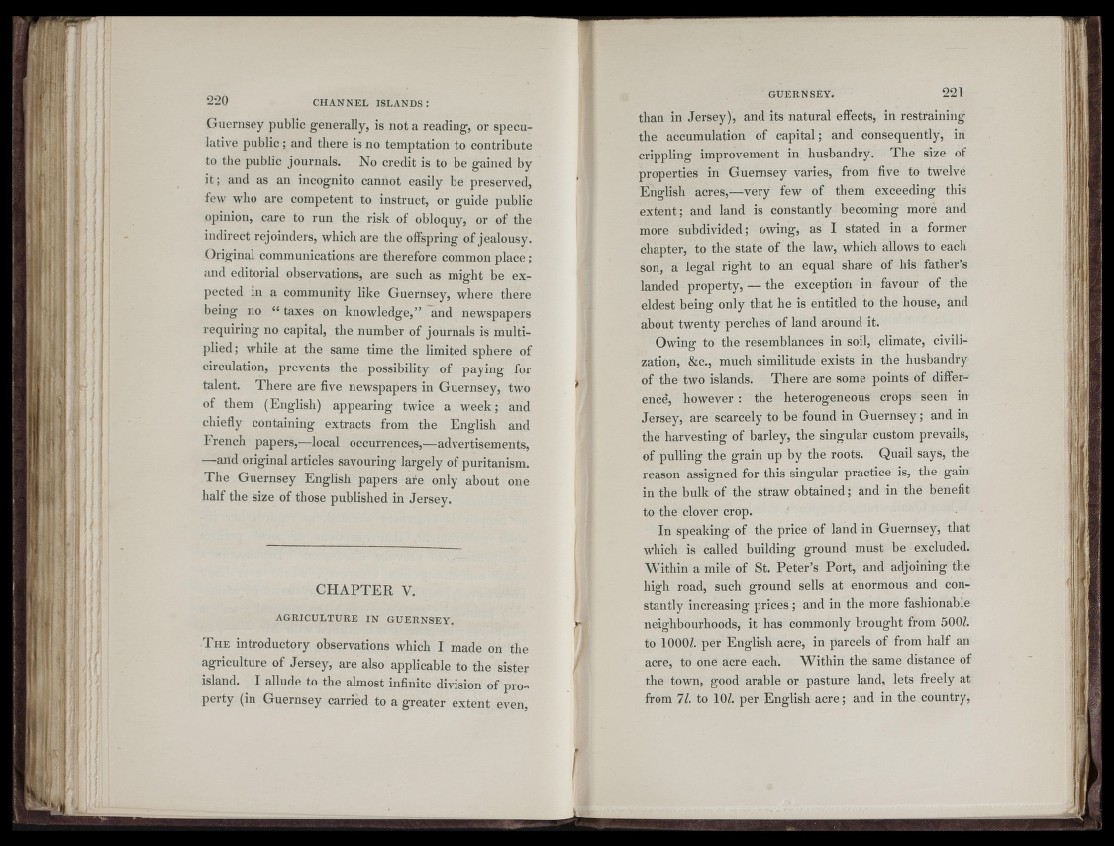
* r
2*20 CHANNEL i s l a n d s :
Guernsey public generally, is not a reading, or speculative
public; and there is no temptation to contribute
to the public journals. No credit is to be gained by
it; and as an incognito cannot easily be preserved,
few who are competent to instruct, or guide public
opinion, care to run the risk of obloquy, or of the
indirect rejoinders, which are the offspring of jealousy.
Original communications are therefore common place;
and editorial observations, are such as might be expected
in a community like Guernsey, where there
being no “ taxes on knowledge,” and newspapers
requiring no capital, the number of journals is multiplied;
while at the same time the limited sphere of
circulation, prevents the possibility of paying for
talent. There are five newspapers in Guernsey, two
of them (English) appearing twice a week; and
chiefiy containing extracts from the English and
French papers,—local occurrences,—advertisements,
—and original articles savouring largely of puritanism.
The Guernsey English papers are only about one
half the size of those published in Jersey.
CH A PT ER V.
a g r i c u l t u r e i n GUERNSEY.
T he introductory observations which I made on the
agriculture of Jersey, are also applicable to the sister
island. I allude to the almost infinite division of property
(in Guernsey carried to a greater extent even.
than in Jersey), and its natural effects, in restraining
the accumulation of capital; and consequently, in
crippling improvement in husbandry. The size of
properties in Guernsey varies, from five to twelve
English acres,—very few of them exceeding this
extent; and land is constantly becoming more and
more subdivided; owing, as I stated in a former
chapter, to the state of the law, which allows to each
son, a legal right to an equal share of his father’s
landed property, — the exception in favour of the
eldest being only that he is entitled to the house, and
about twenty perches of land around it.
Owing to the resemblances in soil, climate, civilization,
&c., much similitude exists in the husbandry
of the two islands. There are some points of difference*,
however : the heterogeneous crops seen in
Jersey, are scarcely to be found in Guernsey; and in
the harvesting of barley, the singular custom prevails,
of pulling the grain up by the roots. Quail says, the
reason assigned for this singular practice is, the gain
in the bulk of the straw obtained; and in the benefit
to the clover crop.
In speaking of the price of land in Guernsey, that
which is called building ground must be excluded.
Within a mile of St. Peter’s Port, and adjoining the
high road, such ground sells at enormous and constantly
increasing prices; and in the more fashionable
neighbourhoods, it has commonly brought from 500Z.
to 1000/. per English acre, in parcels of from half an
acre, to one acre each. Within the same distance of
the town, good arable or pasture land, lets freely at
from 71. to 10/. per English acre; and in the country,
I